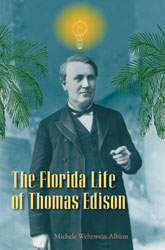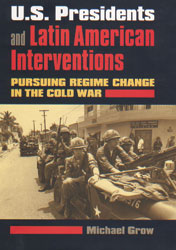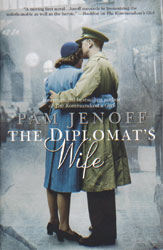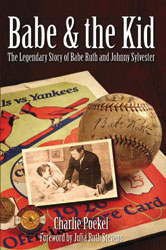Alumni Bookshelf
 The Florida Life of Thomas Edison, (University Press of Florida, 2008) is a history of the inventor’s experiences in the sunshine state by Michele Wehrwein Albion, MA ’91. Between 1885 and 1931, the famous inventor wintered in the isolated hamlet of Fort Myers, Fla., where he worked on his inventions while interacting with neighbors. Filled with photographs, maps, and graphics, Albion’s book also discusses the impact Edison’s wife, Mina, had on the culture and community of Fort Myers.
The Florida Life of Thomas Edison, (University Press of Florida, 2008) is a history of the inventor’s experiences in the sunshine state by Michele Wehrwein Albion, MA ’91. Between 1885 and 1931, the famous inventor wintered in the isolated hamlet of Fort Myers, Fla., where he worked on his inventions while interacting with neighbors. Filled with photographs, maps, and graphics, Albion’s book also discusses the impact Edison’s wife, Mina, had on the culture and community of Fort Myers.
In her new book, While in Darkness There is Light: Idealism and Tragedy on an Australian Commune (Black Lawrence Press, 2008), Louella Bryant, BA ’71, tells the story of five young men who started a commune during the Vietnam era as a way to make sense of a tumultuous world. After living on the commune for a year, Charlie Dean, brother of Democratic National Committee chairman and former presidential candidate Howard Dean, trekked through Southeast Asia and was captured and executed by communist forces. Bryant used journals, letters, and interviews as the resources for the book, which contains an introduction by Howard Dean.
Duncan L. Dieterly, MA ’65, published a book of short stories titled Short Stories One (Xlibris, 2008). This is his first book, which contains 12 short stories in 250 pages. He reports that he is already working on his second. Dieterly, who lives in Moreno Valley, Calif., has four adult children and one grandchild.
Toya L. Evans, BBA ’85, won a Best Title/Nonfiction Award for 2007 from the Southeastern Virginia Arts Association for her book C’ing your Way Clear: Every Woman’s Guide to Handling Life’s Storms (Haci Publishing, 2007). She had a book signing in June at the Borders Express store at the Dulles Towne Center in Sterling, Va.
The Evolution Controversy: A Survey of Competing Theories (Baker Academic, 2007), was co-authored by Thomas Fowler, DSc ’86. The book is an objective review of the scientific positions of four major schools of thought about evolution. It includes the history of evolutionary thought, key facts to explain it, and public policy issues surrounding it. Fowler is a senior principal at Noblis Inc., a not-for-profit consulting firm. He is now working on a companion volume that will cover the philosophical and religious issues of the evolution controversy.
 Michael Grow, PhD ’77, explores the motives underlying recent U.S. efforts to overthrow governments in Latin America in his new book, U.S. Presidents and Latin American Interventions: Pursuing Regime Change in the Cold War (University Press of Kansas, 2008). The book examines White House decision making in eight cases of U.S. interventionism (from Guatemala in 1954 to Panama in 1989) and finds that U.S. leaders’ decisions were consistently based on a desire to project a powerful image. The book also highlights the influential role that Latin American and Caribbean political actors played in promoting U.S. interventions in their countries. Grow recently retired from the history faculty at Ohio University.
Michael Grow, PhD ’77, explores the motives underlying recent U.S. efforts to overthrow governments in Latin America in his new book, U.S. Presidents and Latin American Interventions: Pursuing Regime Change in the Cold War (University Press of Kansas, 2008). The book examines White House decision making in eight cases of U.S. interventionism (from Guatemala in 1954 to Panama in 1989) and finds that U.S. leaders’ decisions were consistently based on a desire to project a powerful image. The book also highlights the influential role that Latin American and Caribbean political actors played in promoting U.S. interventions in their countries. Grow recently retired from the history faculty at Ohio University.
 The Diplomat’s Wife is the second novel Pamela Jenoff, BA ’92, has written about the brutality of the Nazis in WWII and the love that formed despite it. Jenoff’s second book centers on Marta Nederman, a survivor of a Nazi prison camp, and her life after the war. Jenoff, a former U.S. State Department expert on Polish-Jewish relations, now lives in Philadelphia and practices law. Her first book, The Kommandant’s Girl, was published in 2007.
The Diplomat’s Wife is the second novel Pamela Jenoff, BA ’92, has written about the brutality of the Nazis in WWII and the love that formed despite it. Jenoff’s second book centers on Marta Nederman, a survivor of a Nazi prison camp, and her life after the war. Jenoff, a former U.S. State Department expert on Polish-Jewish relations, now lives in Philadelphia and practices law. Her first book, The Kommandant’s Girl, was published in 2007.
Roger Kaufman, BA ’54, professor emeritus at Florida State University and distinguished research professor at the Sonora Institute of Technology in Mexico, has three books from HRD Press: Thirty Seconds that Can Change Your Life (2006); Change, Choices, and Consequences (2006); and The Assessment Book: Applied Strategic Thinking and Performance Improvement Through Self-Assessments (2008). All three books are designed to help the reader make better decisions, plans, and improvements for the future.
Robert Lockwood, PhD ’76, published A Culture of Deception (Xlibris, 2008), a fictionalized political history of congressional lobbying. In his novel, the diversion of a Department of Defense contract from a U.S. company to a lobbyist’s Canadian client leads to bioterrorism, bribery, and the ultimate death of a popular senator. Lockwood is a former counsel to the U.S. Senate Judiciary Committee, and he operated his own lobbying firm before retiring in 2006.
In Backstory in Blue: Ellington at Newport ’56, John F. Morton, BA ’70, MA ’73, gives a behind the scenes look at Duke Ellington’s performance of “Diminuendo and Crescendo in Blue,” recorded at the 1956 Newport Jazz Festival. The piece of music, Morton writes, reflected the feelings and shaped the sensibilities of the postwar generation. In the book, Morton explains why the tune continues to make a profound statement about America at that time by drawing on interviews with fans and music professionals who were there.
The Armchair Reader—World War II (Publications International, 2007) was co-authored by Edward Moser, MA ’91. The book is full of WWII facts and stories, explaining everything from why the Nazis feared the Freemasons to what happened to Japan’s balloon bomb program set to destroy the United States.
Nancy Moses, BA ’70, MA ’74, published Lost in the Museum: Buried Treasures and the Stories They Tell (AltaMira Press, 2007). Moses is a planner for cultural, educational, and cause-related organizations in Philadelphia.
Queen of the Road: The True Tale of 47 States, 22,000 Miles, 200 Shoes, 2 Cats, 1 Poodle, a Husband, and a Bus With a Will of Its Own (Broadway Books, 2008) is a humorous travel memoir about the life-changing trip of Doreen Orion, MD ’85, and her husband, Tim.
 Charles A. Poekel Jr., BA ’71, preserves one of the greatest sports stories of all time in his new book, Babe & the Kid: The Legendary Story of Babe Ruth and Johnny Sylvester (History Press, 2007). The book recounts how Yankees baseball star Babe Ruth delivered his promise to hit a homer for Johnny, an ill New Jersey boy.
Charles A. Poekel Jr., BA ’71, preserves one of the greatest sports stories of all time in his new book, Babe & the Kid: The Legendary Story of Babe Ruth and Johnny Sylvester (History Press, 2007). The book recounts how Yankees baseball star Babe Ruth delivered his promise to hit a homer for Johnny, an ill New Jersey boy.
In Museum Careers: A Practical Guide for Students and Novices (Left Coast Press, 2008), museum professional N. Elizabeth Schlatter, MA ’96, outlines the nature of the profession as a whole, including the rewards and challenges of museum work, the types of museums, and the types of jobs within the museums.
In their new book, Bratproofing Your Children: How to Raise Socially and Financially Responsible Kids (Barricade Books, 2008), Janet Stern Solomon, DBA ’83, and husband Lewis D. Solomon offer everyday parenting strategies for those who want their children or grandchildren to grow up to be productive, motivated, and financially responsible adults. Janet is an adjunct professor of management, and Lewis is the Van Vleck Research Professor of Law at GW Law School.
Humor columnist Jennifer Zajac, BA ’91, has published a collection of funny stories about families, relationships, and the weird stuff parents of young children read and watch in I Read it Somewhere, So it Must Be True: Notes From a Mom Who Reads Too Much (CreateSpace, 2008). Zajac currently covers the renewable energy sector for a financial publisher and writes a weekly humor column, ‘While I Was Out”, which appears in The Fluvanna Review, Buckingham Beacon, Scottsville Monthly, and OC Magazine. Zajac and her husband have two children, ages 6 and 1.
